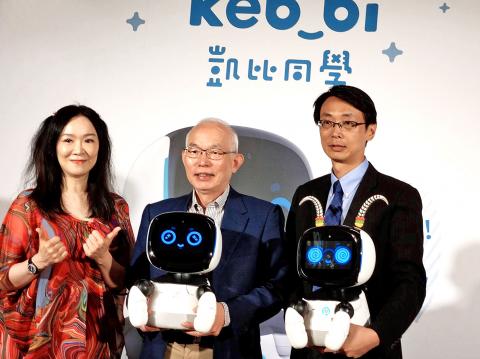Asia Pacific Telecom Co (亞太電信), a subsidiary of Hon Hai Precision Industry Co (鴻海精密), yesterday launched a new companion robot aimed primarily for children, targeting a market beyond commercial robots like Pepper.
The new “Kebbi” robot is manufactured by Hon Hai and designed by artificial intelligence (AI) robotics start-up Nuwa Robotics (Hong Kong) Ltd (女媧).
Hon Hai joined Nuwa’s second-round funding by investing US$35 million, giving it a 9 percent share of the start-up.

Photo: Wang Yi-hung, Taipei Times
The care-giving robot is able to play and chat with children, Nuwa said.
With a facial recognition feature, Kebbi can identify about 400 objects, the company said.
It can also be programmed to work as a tutor, helping young students and preschoolers study and practice English, it said.
“Some kindergartens have shown a strong interest in Kebbi. Local libraries are also keen on the robot and have ordered six,” Asia Pacific Telecom president Huang Nan-ren (黃南仁) told reporters at a media briefing in Taipei.
The company’s ultimate aim is to have a Kebbi robot in all Taiwanese households, Huang said.
Taiwan has about 7 million to 8 million households.
Pepper, the humanoid robot designed by Softbank Group Corp, targets the commercial market, Huang said.
It is designed to entertain people at commercial venues, such as shopping malls, banks and railway stations, rather than for households, he said.
With a price tag of NT$12,900, Kebbi robots will be available from Oct. 16, Asia Pacific Telecom said.
Mobile users can get the robot for NT$990 through a 30-month data service contract with Asia Pacific Telecom at a minimum fee of NT$996 a month.
Kebbi was launched in the Chinese market in the middle of June on the Web site of Xiaomi Corp (小米) under a different name, Nuwa founder and chief executive officer Leo Guo (郭柳宗) said.
It is called “Danny” in China, he said, adding that the company sold 1,000 Danny robots within 24 hours of the launch.
Xiaomi is one of the first angel investors in Nuwa, injecting 15 million yuan (US$2.18 million) in the start-up, Guo said.
Nuwa plans to start a third-round funding after raising US$12 million in the first and second rounds, he said.

Intel Corp chief executive officer Lip-Bu Tan (陳立武) is expected to meet with Taiwanese suppliers next month in conjunction with the opening of the Computex Taipei trade show, supply chain sources said on Monday. The visit, the first for Tan to Taiwan since assuming his new post last month, would be aimed at enhancing Intel’s ties with suppliers in Taiwan as he attempts to help turn around the struggling US chipmaker, the sources said. Tan is to hold a banquet to celebrate Intel’s 40-year presence in Taiwan before Computex opens on May 20 and invite dozens of Taiwanese suppliers to exchange views

Application-specific integrated circuit designer Faraday Technology Corp (智原) yesterday said that although revenue this quarter would decline 30 percent from last quarter, it retained its full-year forecast of revenue growth of 100 percent. The company attributed the quarterly drop to a slowdown in customers’ production of chips using Faraday’s advanced packaging technology. The company is still confident about its revenue growth this year, given its strong “design-win” — or the projects it won to help customers design their chips, Faraday president Steve Wang (王國雍) told an online earnings conference. “The design-win this year is better than we expected. We believe we will win

Chizuko Kimura has become the first female sushi chef in the world to win a Michelin star, fulfilling a promise she made to her dying husband to continue his legacy. The 54-year-old Japanese chef regained the Michelin star her late husband, Shunei Kimura, won three years ago for their Sushi Shunei restaurant in Paris. For Shunei Kimura, the star was a dream come true. However, the joy was short-lived. He died from cancer just three months later in June 2022. He was 65. The following year, the restaurant in the heart of Montmartre lost its star rating. Chizuko Kimura insisted that the new star is still down

While China’s leaders use their economic and political might to fight US President Donald Trump’s trade war “to the end,” its army of social media soldiers are embarking on a more humorous campaign online. Trump’s tariff blitz has seen Washington and Beijing impose eye-watering duties on imports from the other, fanning a standoff between the economic superpowers that has sparked global recession fears and sent markets into a tailspin. Trump says his policy is a response to years of being “ripped off” by other countries and aims to bring manufacturing to the US, forcing companies to employ US workers. However, China’s online warriors